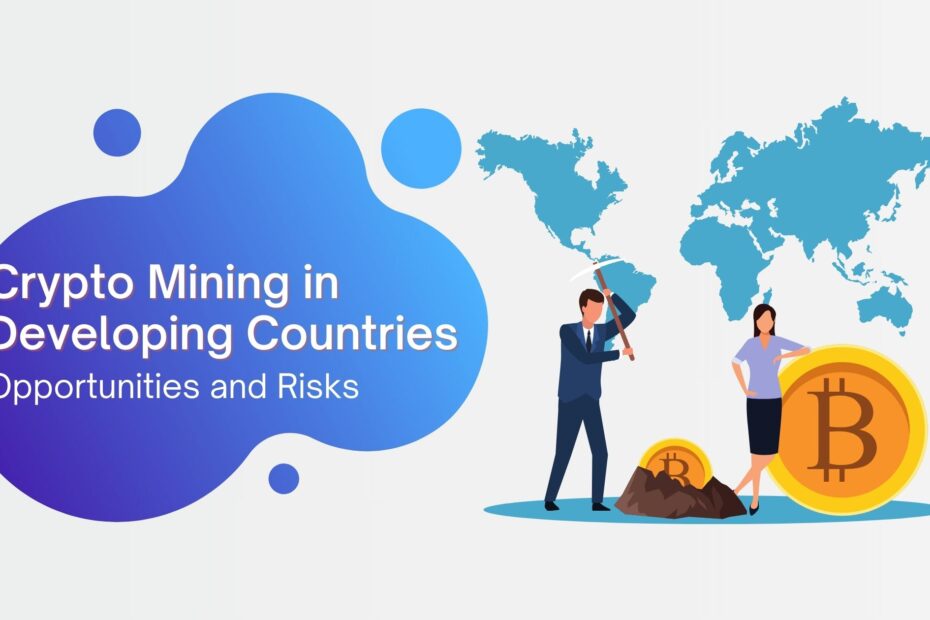Cryptocurrency mining is a growing trend, increasingly influencing the global economy. Its impact is particularly notable in developing countries, where it presents a set of significant opportunities and risks. Mining involves validating transactions and confirming the security of the cryptographic network, rewarding miners with cryptocurrency.
Economic Opportunities
Job Creation and Income Generation: In socioeconomic contexts where job opportunities may be limited, cryptocurrency mining can create tangible employment. This includes roles from equipment maintenance and manufacturing to managing mining facilities—potentially adding notable income, especially in regions with lower energy costs.
Attracting Investments: Entrepreneurs in the cryptocurrency mining sector can attract foreign investments, which can drive innovation and economic development in the region.
Financial Inclusion: Cryptocurrencies can be particularly valuable for those excluded from the conventional financial system, providing affordable and democratic financial services.
Fostering Entrepreneurship: Cryptocurrency mining can inspire and encourage entrepreneurial spirit, enabling the emergence of new and disruptive businesses, especially among young entrepreneurs.
Social and Environmental Challenges
Energy Consumption: The high energy intensity of cryptocurrency mining can raise concerns about the sustainability of such practices, especially in countries with unstable power grids.
Environmental Impacts: The generation of electronic waste and the inherent energy consumption of mining present serious environmental challenges.
Nuisance and Pollution: Mining activities can result in noise and pollution, potentially creating unfavorable conditions for local communities.
Economic Inequity: While cryptocurrency mining can be a source of income, its benefits tend to be enjoyed by those with access to capital and technology, exacerbating existing economic inequality.
Uncertain Regulations: The absence of clear regulations creates a legally insecure environment that can hinder the development of this industry.
Recommendations
Promoting Sustainable Mining: Policies should encourage mining with renewable energy sources and promote energy-efficient use.
Clear Regulations: Regulations regarding cryptocurrency mining should be clear and transparent, aiming to balance economic benefits with environmental protection and local interests.
Mitigating Environmental Impacts: Measures should be implemented to mitigate the negative impacts of mining on the environment, such as reducing noise, pollution, and electronic waste generation.
Promoting Financial Inclusion: The use of cryptocurrencies should be explored to expand access to financial services for unbanked populations.
Encouraging Responsible Innovation: The development of more efficient and sustainable mining technologies should be supported.
Conclusion
Cryptocurrency mining presents a range of opportunities and risks for developing countries. To maximize economic and social benefits and minimize potential negative impacts, it is crucial to implement appropriate policies and regulations. Collaboration between governments, the private sector, and civil society is essential to ensure the sustainable and responsible development of cryptocurrency mining.
An important mention in this regard is Mining Bitcoins Online. This company strives to provide clear and straightforward guidance on crypto mining, enabling shareholders to identify lucrative investment opportunities, understanding that mining entails reduced risk and provides a constant source of income.
Frequently Asked Questions
Does cryptocurrency mining create jobs? Yes, cryptocurrency mining creates jobs in areas such as maintenance, manufacturing, and management of mining facilities.
Does the cryptocurrency mining process affect the environment? Yes, cryptocurrency mining requires a large amount of energy and generates electronic waste, which can negatively impact the environment.
Is it legal to invest in cryptocurrency mining in developing countries? It depends on the country and its regulatory framework. Some countries have adopted laws and regulations that allow cryptocurrency mining, while others have prohibited such activities.
How does cryptocurrency mining contribute to economic development? Cryptocurrency mining can create new jobs and income, attract foreign investments, promote financial inclusion, and foster entrepreneurship.
What measures can be taken to make cryptocurrency mining more sustainable? There are several strategies for more sustainable cryptocurrency mining, including using renewable energy, improving energy efficiency, recycling waste, and developing more efficient and less polluting mining technology.

